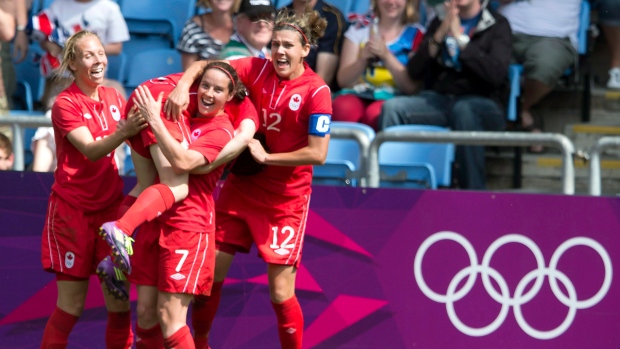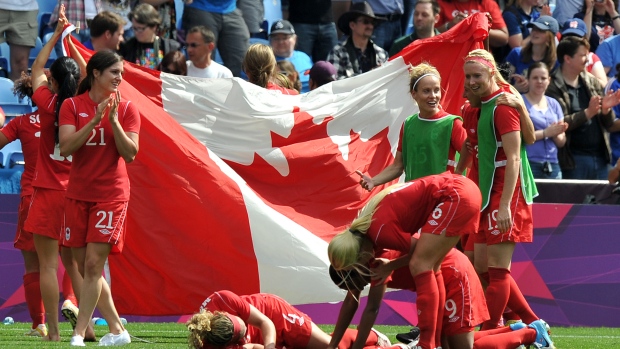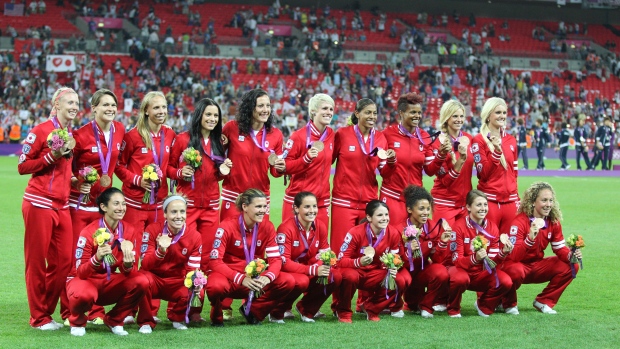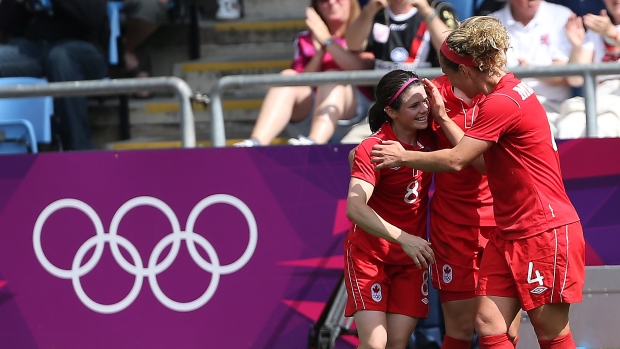Jun 30, 2017
TSN.ca's Canada 150: Bronze in London
It’s a rarity, then, when a team from a sport other than hockey captures the country’s imagination, steps into the spotlight and emerges as superstars. Such a case happened at the 2012 London Summer Olympics with the women’s national soccer team. By the time that tournament ended, that team of 20 players became household names in a country where soccer and virtually everything else takes a backseat to hockey.
, TSN.ca Staff

Canada and hockey are synonymous.
When a Canadian team doesn’t succeed in any sort of international tournament, the country finds itself on the precipice of an existential crisis. How did this happen? What can we do to fix it? This can’t happen again.
That is the level of obsession this country has with the game of hockey.
It’s a rarity, then, when a team from another sport captures the country’s imagination, steps into the spotlight and emerges as superstars.
Such a case happened at the 2012 London Summer Olympics with the women’s national soccer team. By the time that tournament ended, that team of 20 players became household names in a country where soccer and virtually everything else takes a backseat to hockey.
Heading into the Olympics, expectations for the CWNT ran high thanks to the recent appointment of John Herdman as manager. The 37-year-old Brit had taken over the reins of the team in 2011 following a five-year stint with New Zealand. Under Herdman, the team claimed gold at the 2011 Pan Am Games in Mexico City and were ready for CONCACAF Olympic qualifying in January 2012.
“John had come in as a new coach in the fall and we’d pretty much only had him for a short time,” midfielder Diana Matheson said. “We went to the Pam Ams the fall before and that was our first experience with him. Everything was kind of still pretty fresh and new and exciting with him at that point. He brought a real positive energy back to the group and kind of reignited our passion and excitement for playing for Canada.”
To qualify for London, the team had to at least advance to the tournament’s final game. Advantageously, the CONCACAF qualifiers were held on home soil in Vancouver, but that didn’t come without its pressure.
“Our Olympic qualifying tournament is the most stressful tournament we have in the four-year tournament because it always comes down to one game,” Matheson said. “So it was just focus and preparation leading into that tournament and it was at home, too.”
Canada advanced to the final in front of over 25,000 people at BC Place, but was smashed 4-0 by their archrivals, the United States. Still, it was mission accomplished with the trip to London confirmed.
The Canadians – seventh in the FIFA World Ranking at the time - were drawn into a group with two of the top four teams in Sweden (No. 3) and Japan (No. 4). South Africa (No. 61) rounded out the group.
The tournament got off to an inauspicious start in Canada’s opening match with Japan in Coventry on July 25. By the half, it was 2-0 Japan on goals from Nahomi Kawasumi and Aya Miyama and Canada would go on to drop the opener, 2-1.
Matheson says the team was disappointed, but felt that there were positives to be gleaned from the game.
“We still felt that we were holding back a little,” Matheson said. “We were playing it safe and that whole game felt like we hadn’t quite got there. The second half was better. We pulled back a goal. Melissa Tancredi put in one of her many goals of the opening round. It was an underwhelming performance for us, I think, but at the same time, it was after that game we’d gained some good confidence out of it because we felt like we should have done much better against Japan had we got a bit more out of ourselves.”
In the second match of the opening round, Canada faced lowly South Africa and came away with a comfortable 3-0 win with Tancredi scoring early on and Christine Sinclair providing a second-half brace. Still, Matheson felt the team wasn’t yet firing on all cylinders with an important game with the Swedes yet to come.
“[South Africa] was a must-win for sure and we started getting the goals rolling a little bit, but even in that game we did not get to the performances we wanted still so it was still a little bit of a clunky feeling coming out of that game,” Matheson said. “We knew for that Sweden game we would really have to step up to the next level if we wanted to go far in that tournament.”
Matheson believes it was a difficulty in finding a rhythm early on that hindered Canada’s play.
“I think in big tournaments, it’s hard to get into the groove right away,” Matheson said. “There’s a lot of stress. There’s a lot of pressure. The Olympics is a big moment and it’s hard to come out flying in the opening games. We got better at it since then but I think it is just around that it’s hard to play your best game of the tournament in game one. At the same time, you don’t want to play your best game in game one of the tournament, you want to grow and get better throughout.”
On top of the important nature of the Sweden game, it was a homecoming for Herdman. A member of the Toon Army, Herdman would be coaching in front of family and friends at Newcastle United’s home grounds.
“It was his childhood dream to play on that field,” Matheson said of her coach. “It was awesome to watch him. He got really emotional around that game at St. James Park. In that game, we knew we had to get a result. We went down two in the first 20 minutes, but we had been playing well, which is kind of the way it goes. We didn’t even miss a beat. We kind of just kept playing and performing and Melissa got another barnburner that game and got us two goals. I think that was the turning point for our team was that Sweden game and going down two goals and changing nothing and just staying on script.”
Canada needed to finish in at least third place in Group A to qualify for the knockouts, so Tancredi’s tying goal in the 84th was just the tonic the team needed.
“John and the staff were aware of the results in the other games, too, and so it was a question of whether we wanted to push for the win or hold it down for the tie,” Matheson said. “It was a bit of a frantic moment then.”
With a 2-2 draw, Canada set up a date with the hosts Great Britain in the quarterfinals back in Coventry. The Brits represented a daunting task even without the added pressure of playing in front of a partisan, hostile crowd.
“It was a loud one, but I think playing at home is always tough, which we’d heard about before that tournament and we experienced later when we were back in Canada [for the 2015 World Cup],” Matheson said. “Actually, there’s a lot of pressure on those guys and going into that game, Great Britain was winning medals left and right, it was gold after gold on TV. You could watch it there and we knew they were watching.”
Canada planned to use that crowd against the hosts.
“We knew if we could get up a goal early, it would put them under pressure and they could start to show some cracks and that’s kinda how the game played out,” Matheson said.
Only 12 minutes in, Jonelle Filigno grabbed Canada a precious lead and the CWNT didn’t park the bus.
“We went up one and we had them under pressure the whole game. I think we scored the second on that [Sinclair] free kick [in the 26th] and then we locked it in and there was no doubt we were going to come away with it,” Matheson said. “The crowd started out as a factor but that early goal kind of quieted them down a bit.”
With the 2-0 win over Great Britain, Canada moved on to face a familiar foe in the semi-finals: the USWNT. Leading up to the Olympics, the U.S. outscored Canada 18-3 in eight matches. The team knew the battle would be an uphill one.

But Canada would get off to an atypical start in that Aug. 6 matchup at The Theatre of Dreams, Manchester’s Old Trafford.
In the 22nd minute, Marie-Eve Nault found Tancredi at the edge of the area. Tancredi found a streaking Sinclair, who wove through two defenders and beat Hope Solo to give Canada a 1-0 lead.
“I think the feeling around that game was that we had let the reins off and we were kind of flying,” Matheson said. “It felt like we were playing well which we did not always do against the U.S. We played kind of caged a bit, a little bit scared, but that game didn’t have that feel at all. We were going at them fully.”
Megan Rapinoe evened matters for the U.S. shortly after the half off of a corner, but Sinclair would restore Canada’s lead 13 minutes later, heading home from a Tancredi cross.
Rapinoe bagged her second of the match only three minutes later, leading to even more heroics from Canada’s all-time leading goal scorer. Three minutes after Rapinoe’s equalizer, Sinclair got her hat trick with another header, this time off of a corner.
Sinclair was a one-woman wrecking crew.
“Every chance we got, she put it in; that’s what it felt like,” Matheson said of Sinclair. “That first goal was my favourite and then the Melissa Tancredi cross she put in the corner. It just felt like she was on the end of everything in that game. She was going to drag us through on to the final.”
But the fairytale ending didn’t come for Canada. In the 80th, the USWNT were beneficiaries of one of the oddest calls in recent history.
Canadian keeper Erin McLeod was ruled to have been wasting time in her area, resulting in an indirect free kick given by referee Christina Pederson. While there is a FIFA rule that indicates handling the ball for more than six seconds constitutes a foul, it’s a discretionary one and rarely ever enforced anywhere in the world.
“Nobody has seen it before or since,” Matheson said. “It was a wild call.”
Rapinoe took the ensuing free kick and hammered it into the wall where Scott was called for a handball resulting in a penalty. American captain Abby Wambach coolly slotted home from the spot to force extra time.
It was in extra time that Alex Morgan broke Canadian hearts.
In the dying seconds of stoppage ahead of penalties, Morgan’s arching header off of a Heather O’Reilly cross looped over a diving McLeod to give the USWNT passage to the gold-medal game.
Canada was felled yet again by the United States.
As disappointing and soul-crushing the loss was for Canada, their job wasn’t finished and their Olympics weren’t over. There was still a chance at hardware.
“It was obviously emotionally draining,” Matheson said of the aftermath. “We were a bit mentally shattered after that game. It just felt like we played well enough to win that game and we lost to the U.S. again. We had thrown everything we could at them and it just wasn’t enough again. We felt so drained from it and obviously we were so physically exhausted as well as going into overtime. But the Olympics are kind of a two-day turnaround and John gave us some time on our own to recover that night. He usually doesn’t talk to us after games anyway and then part way through the next day, we just had our meeting to regroup and focus on the next game and then it was on to the next task.”
Canada would meet France for bronze back in Coventry on July 9.
Before then, though, as a means to motivate his players, Herdman let his team in on the interest level they generated back home in Canada at a team meeting. An estimated 3.8 million people across the country watched the semi-final.

“I remember John had put in that meeting some notes from Canadians,” Matheson said. “Just regular Canadians and other athletes saying how proud of us they were and that they supported us and they were just proud Canadians watching that game. I think that helped a lot, as well. We were in a bubble over there so we didn’t really get a sense of how behind us Canada got until we got home but we got a little taste of it in that meeting which helped a lot.”
After the meeting, the team got back to the task at hand.
“Then it was just about focusing on what we’d come to London for and it was to get on the podium and we were so clear on that,” Matheson said. We were really focusing back in, we were so aware. We had one more game to be on the podium and just one more win, so it was about getting back to business.”
But the preparations seemed all for naught at the rate the bronze-medal match was going for the Canadians.
“It started off well for the first 20 and then the wheels just fell off and physically we just weren’t in it anymore,” Matheson. “It was the hottest day in the history of Coventry someone said, but I don’t know how accurate that was. But it was a warm day, for sure, which didn’t help us and we were just a step off the pace after the first 20 minutes and then it felt like we were under the cosh for the next 70 minutes or so.”
Despite France’s dominance, they couldn’t find a goal, with shots ringing off the post or being cleared at the line. Just as it appeared that Canada would be heading to another extra time, Matheson did something about it herself.
In the dying seconds of stoppage, Canada rushed towards the French area. Sophie Schmidt was dispossessed on the edge of the area, but Matheson quickly recovered and fed it back to Schmidt. Schmidt turned and fired with French keeper Sarah Bouhaddi coming off her line to cut the angle. But the shot never made it to Bouhaddi, deflecting into the air off a defender. Matheson collected the ball and calmly fired it home to win the bronze medal for Canada.

Matheson says she has no recollection of the goal.
“It was kind of one of those things,” Matheson said. “Like, you’re in the moment, not sure what happened. When I was on the field, I described it all wrong. I have obviously seen it a few times and I have a clearer picture of what went down.”
Personally, Matheson puts the goal and that tournament at the apex of her career highlights.
“That moment obviously was the icing on the cake for that tournament to be able to get on the podium, but that whole London tournament was the number one moment for me because of the journey we went through all those games,” Matheson said. “Through the Sweden game, through the U.S. game, though John coming in the year before. That whole tournament was for sure a career highlight for me and the fact that it was such a watershed moment, I think, for Canadian soccer and our program and the support we got before London versus after London. It was such a huge moment for us.”
That tournament, Matheson says, changed the team’s perception in the eyes of Canadians. Once on the fringe of the mainstream, the women became household names.
“It wasn’t until we got home, probably a day or two after the closing ceremonies and there were hundreds of people in the airport both in Toronto and Vancouver waiting for us to come back,” Matheson said. “Then we got a bit of a sense just how excited people were for us and how much support we got. Even months after that, people were stopping us on the street. It was incredible since some of us were on the national team for 10 years and people had no idea who we were. Then suddenly, we come home and everything is changed.”
That change could be seen less than three later when Canada would put on the most successful FIFA Women’s World Cup in tournament history.
